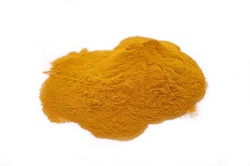|
A common South Asian spice called curcumin may help ease the effects of Alzheimer's and Parkinson's diseases according to a recent study. Curcumin is derived from tumeric and is the main ingredient in most curry powders.
Two key factors are linked to neurodegenerative disorders such as Alzheimer's and Parkinson's. First, DNA in the brain is damaged by reactive oxygen species--a byproduct of the cells' natural metabolism process. Second, the affected regions of the brain have unusually high levels of iron and copper. Scientists at the University of Texas medical branch at Galveston recently discovered a link between these two factors. The effect is a "double whammy" according to Muralidhar Hegde, a postdoctoral fellow and the lead author of the new study, which was published in the most recent issue of the Journal of Alzheimer's Disease. The excess of iron and copper produces more reactive oxygen species, which attack DNA, causing cell damage. DNA has enzymes to repair the damage these oxygen molecules cause, but excessive amounts of iron and copper inhibit the repair enzymes from doing their job. It is this traffic jam of damage and disrepair that is thought to lead to neurodegenerative disorders. One solution is to protect the enzymes from the iron and copper. The scientists found that curcumin may be a possible solution.
0 Comments
|
with intentions.
|

 RSS Feed
RSS Feed
